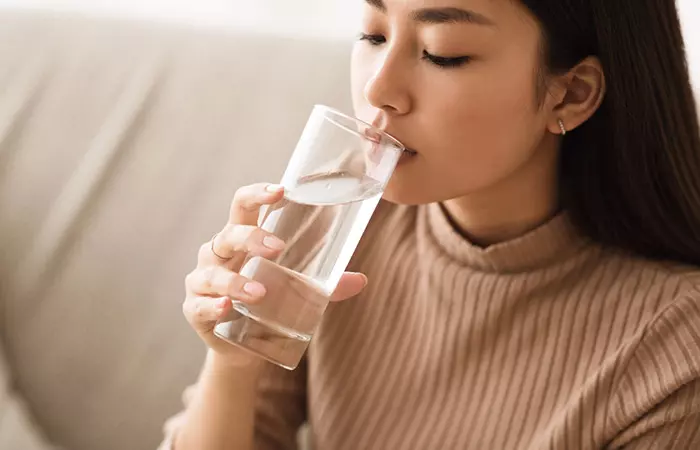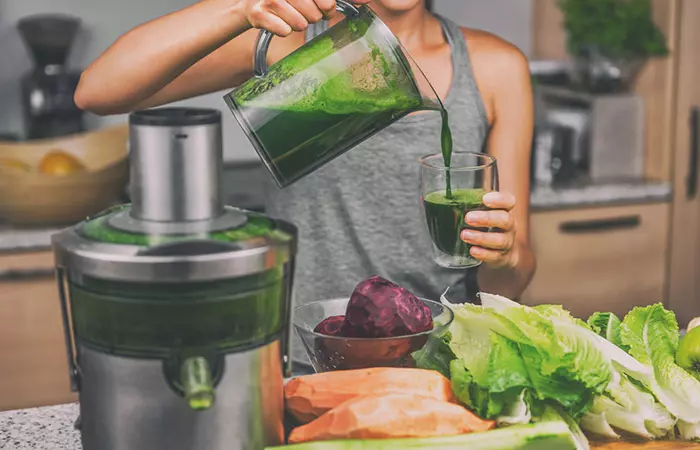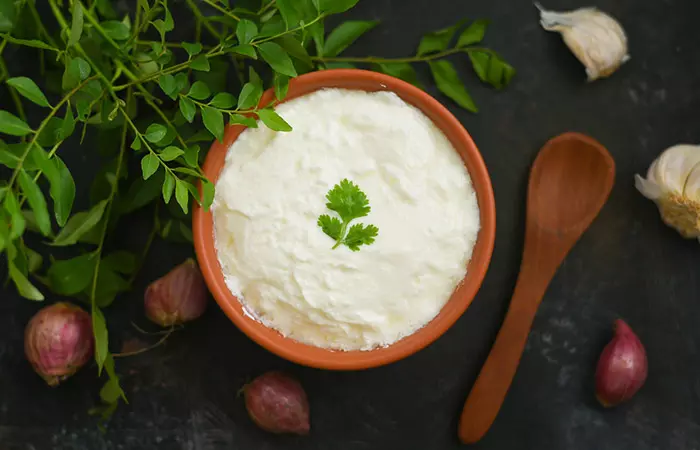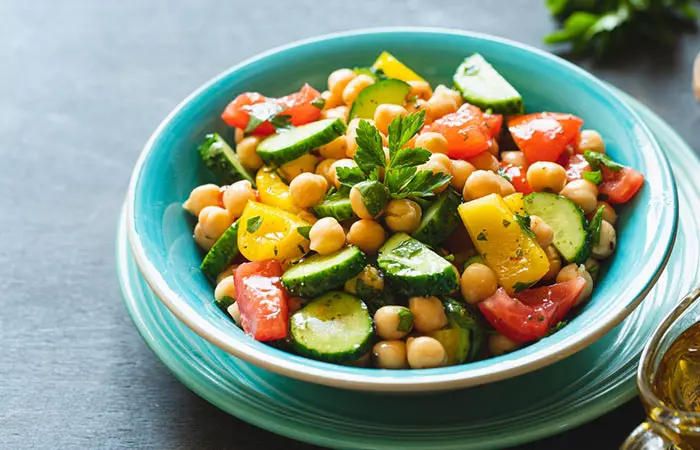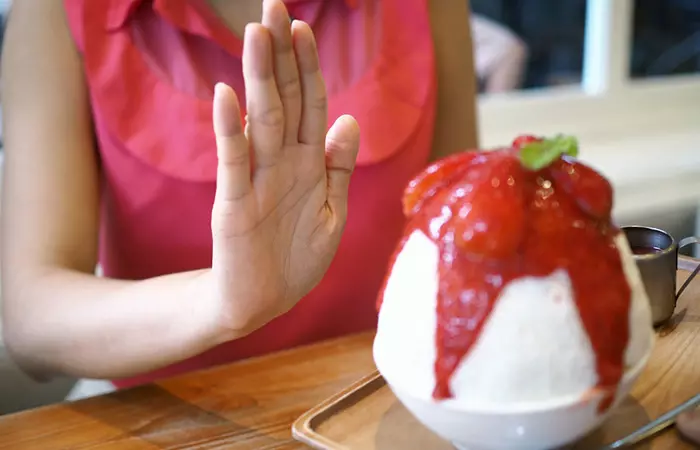What To Do After Eating Oily Food
1. Drink Lukewarm Water
Drinking lukewarm water after consuming oily food helps soothe and activate your digestive system. Water acts as a carrier for nutrients and waste products (2). Drinking hot water helps break down the nutrients into their digestible form. If you do not drink enough water, the small intestine will absorb water from food for digestion, leading to dehydration and constipation. On the other hand, drinking ice water with meals is a huge stress on your digestion. Not only does it dilute your stomach acid, but it chills all the organs responsible for processing your food. Your body has to heat itself up again before recovering. So it is better to drink lukewarm water regularly, especially in the morning.
2. Have A Detox Drink
Detox drinks help flush out toxins that get accumulated in your system after consuming oily foods. Some researchers suggest that detoxification programs or detox drinks help release toxins and aid weight loss. However, these studies are not conclusive (3). A study on Korean women showed that drinking lemon water lemon juice or following a lemon detox diet reduced body fat and improved insulini A pancreatic hormone responsible for regulating blood sugar levels in the body. resistance (4). You can try out DIY detox drinks for weight loss to help you feel better after consuming oily foods. Drinking a detox juice and avoiding spicy foods after oily food consumption will surely help you in the long run. Avoid caffeine after oily food consumption for optimal digestion.
3. Take A Walk
Walking for 30 minutes after a heavy meal helps improve digestion. It promotes better stomach motility, aiding digestion, and may also help you lose weight (5), (6). Hence, go for a slow walk for 30 minutes after eating greasy food to relax your body. Do not indulge in heavy exercise or physical activity after oily food consumption.
4. Plan Your Next Meal
Planning your meals in advance helps you avoid consuming junk and oily foods on an impulse. Avoid eating greasy meals. Ensure having a healthy and wholesome breakfast that keeps you charged for the day. Do not skip it. Studies have shown that the general effects of skipping breakfast as a habit, are harmful. It is best to take small meals after oily food consumption. Include veggies and whole grains in your diet, keep yourself hydrated by drinking adequate water and juices, and have a light dinner. Opt for chewing slowly and thoroughly after oily food as well as everyday meal for better digestion.
5. Take Probiotics
Regular intake of probioticsi Live microorganisms that benefit the digestive system. helps balance digestive health and improves gut flora and immunity (7). You can have a cup of yogurt or curd. Add tempehi Indonesian food with a nutty flavor made from fermented soybeans. or nato to your diet plan to strengthen your gut after consuming oily food.
6. Drink Herbal Teas
Consider drinking digestive herbal teas like ginger or peppermint to soothe your stomach and enhance digestion. Ginger tea is known for its anti-inflammatory properties, which may help reduce nausea and promote the passage of food through the digestive tract, alleviating discomfort (8), (9). Peppermint tea contains menthol, which relaxes the muscles of the gastrointestinal tract, easing symptoms of bloating and gas while promoting smoother digestion (10).
6. Consume More Fruits And Vegetables
Consuming fruits and vegetables after oily food consumption helps provide enough vitamins, minerals, and fiber to your body to carry out various processes (11). Eating oily foods that are devoid of fiber and essential micronutrients and high in saturated and trans fats may lead to constipation (12). Fiber-rich foods to eat after oily food includes having a bowl of fruits with nuts and seeds as a refreshing mid-morning snack. Start your meal with a bowl of salad and fresh vegetables to continue the supply of essential nutrients to your body. A blogger shares that having fruits is important as they are a source of nutrients and balance the overall energy levels of the body. She adds, “Me personally I like to have a big breakfast of fruits and a big fruit smoothie or a big bowl of 1-2 types of fruits (i).”
7. Sleep Well
Sleeping helps boost your mood, gets rid of hangovers, and relaxes your mind, body, and soul. Hence, relax and sleep well and avoid emotional eating. In a cross-sectional cohort study with 5792 participants, it was discovered that 85.43% (n = 4948) belonged to the group with no sleep disturbances, while 14.57% n = 844) belonged to the group with disturbances. Additionally, these participants also complained of specific digestive symptoms like abdominal pain, acid regurgitation, abdominal distension, and eructation.
8. Try Digestive Bitters
If you feel like your meal is just sitting in your stomach, try bitters to aid your digestion.
9. Use Digestive Enzymes
There is a great alternative to antacids after oily food consumption. It is is taking digestive enzymes supplements for oily food. This takes the stress of a big meal off your organs and helps your body recover. If you are vegan, worry not! Vegan options are available using only enzymes from fruits like pineapple and papaya.
10. Magnesium
If you experience constipation, consider supplementing with magnesium. This overlooked mineral not only helps keep things moving, but also helps your muscles recover and relieves aches and cramps.
What You Should Not Do After Eating Oily Food
1. Avoid Eating Cold Foods
Eating cold foods, such as ice cream, after consuming oily food has adverse effects on the liver, stomach, and intestines. Oily food is difficult to digest. Following it up with cold food makes digestion difficult, and you might experience bloating and indigestion. Hence, avoid consuming cold foods after heavy meals. Avoiding alcohol after oily food consumption can also be helpful.
2. Do Not Go To Bed Immediately After Eating
Avoid lying down after oily food consumption. Never go straight to bed after a heavy meal. Always give a gap of 2-3 hours between dinner and bedtime. Sleeping immediately after a meal makes food difficult to digest, causing bloating and enhancing fat deposition.
3. Avoid Heavy Physical Activity
Avoid engaging in heavy physical activity, such as rigorous workouts or difficult tasks, after consuming oily food. It’s because oily foods are more difficult to digest, and intense physical activity can take energy away from the digestive tract, which may slow down digestion. Limiting or avoiding your oily food intake is essential to reducing the risk of obesity and other health issues. Check out the next section for some simple tips to do so.
How To Avoid Oily Foods
Here are you can do to avoid eating oily foods:
Opt for cooking methods like steaming, sauteing, or grilling. Bake your chips or snacks instead of deep frying them. Eat slowly and mindfully to promote fullness and avoid overeating. Opt for healthier fats, like peanut butter, to fulfill your cravings.
Do your research and go for a short-term low-cholesterol diet. If you have specific dietary needs or goals, consult a healthcare professional or registered dietitian for personalized advice to ensure all your nutrient needs are met. Can we drink milk after eating oily food? Check out the infographic below to learn about the quick, simple ways to recover from your greasy food indulgence.Illustration: StyleCraze Design Team Many people prefer to drink warm milk after eating oily food, which works. However, drinking water after oily food is the best option as it helps you digest heavy food and reduce the heavy feeling of oily items. Does tea help with oily food? Yes. you can drink digestive teas after oily food consumption. It may offer relief from the greasy feeling after a heavy meal. Go for herbal teas such as ginger tea, peppermint tea for better digestion. Is it necessary to take medication after eating oily food? No, it is not necessary to take medications after eating oily food. You can try the remedies discussed above. Take medicines only if these remedies show no results. Why do you feel sick after oily food? Oily food contains high amounts of fat, which slows down digestion and may cause bloating. Therefore, some people feel sick after consuming oily food. Does oily food cause acne? Oily food may cause acne because of its high-fat content. As per a study, factors like high GI/GL food, dairy products, fat food, and chocolates can promote acne (13). Does oily food cause stress? Oily foods with high-fat content can cause inflammation. Studies suggest that the gut microbiome also influences brain areas that are involved in both mood and appetite (14). Therefore, oily food may cause stress. Does oily food affect the brain? Oily foods like cookies, chips, and other packaged foods may contain trans fat. These have an adverse effect on the brain and nervous system as they can alter the neurons’ ability to communicate and reduce mental performance (14). Does oily food cause hair fall? Consuming oily foods, dairy products, and foods with high GI may cause overproduction of sebum on the scalp. It can block the hair follicles and may lead to hair fall and prevent hair growth (15).
